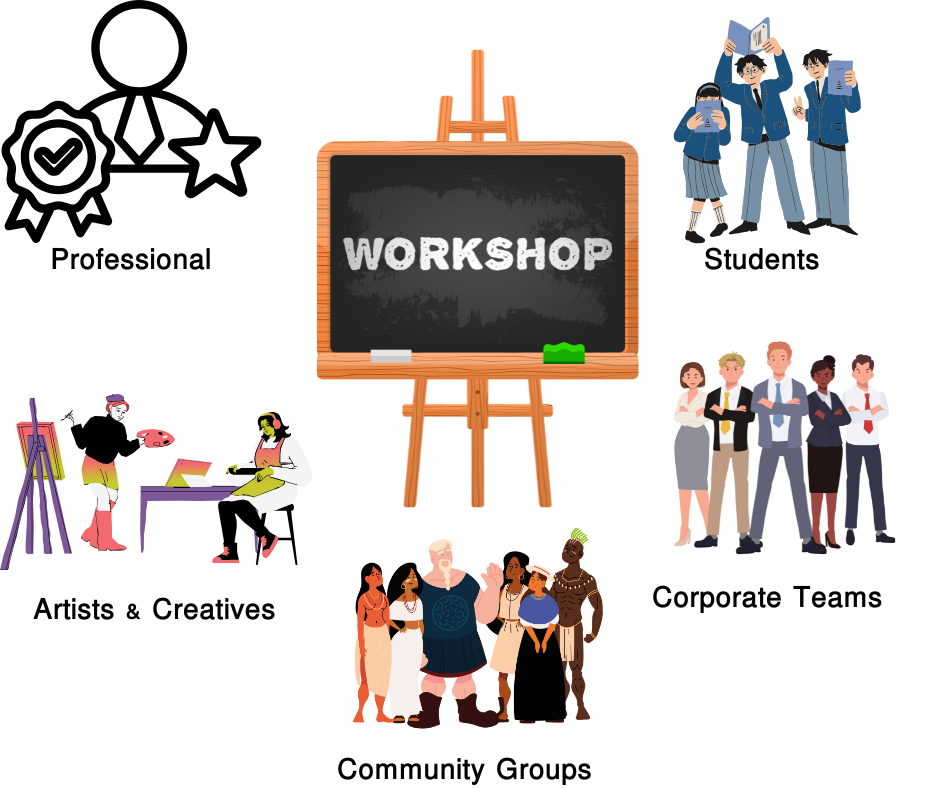A workshop is a carefully organized and interactive experience where participants actively engage in hands-on activities, group discussions, and skill-building exercises with the goal of enhancing their knowledge or solving specific problems. Workshops can be educational environments where new ideas are taught, creative gatherings where artistic projects are created, or professional development sessions that aim to improve workplace skills, depending on the focus. These workshops are often facilitated by an experienced leader or expert who guides participants through the process, ensuring that each individual gains practical insights and valuable abilities.
Some crucial workshop guidelines
The following some crucial workshop guidelines should be adhered to by participants in order to guarantee a constructive and successful environment that promotes learning and cooperation:
1. Be Punctual – Arriving on time demonstrates respect for the facilitator and fellow participants. Make it a priority to reach the venue ahead of schedule and return promptly after breaks to ensure you don’t miss any important information.
2. Be Prepared – Come equipped with all necessary materials, such as notebooks, pens, or specific tools required for activities. Additionally, approach the workshop with an open and receptive mindset, ready to absorb new concepts.
3. Respect Others – Engage in active listening by focusing fully on the speaker and acknowledging their contributions. Allow each participant the opportunity to express their thoughts without interruption, fostering a supportive environment.
4. Stay Engaged – Consciously participate in discussions, share your insights, and contribute to group activities. Being involved not only enhances your own learning experience but also enriches the experience for others.
5. Follow Instructions – Carefully adhere to the facilitator’s guidelines and understand the workshop agenda. This helps maintain order and allows the session to flow smoothly.
6. One Speaker at a Time – Practice patience by allowing each person to finish their thoughts before responding. This rule helps maintain clarity in communication and ensures everyone’s voice is heard.
7. Keep an Open Mind – Embrace new ideas and perspectives that may differ from your own. This openness fosters creativity and innovation and can lead to meaningful discussions.
8. Constructive Feedback Only – When providing feedback, aim to be positive and constructive. Frame your suggestions in a way that supports growth and improvement rather than discouraging others.
9. Stay on Topic – Keep discussions focused on the goals and objectives of the workshop. This enhances the learning experience and ensures that time is used effectively.
10. No Side Conversations – To minimize distractions, avoid engaging in side conversations with fellow participants. This helps maintain a respectful and attentive atmosphere for all involved.
11. Respect Time Limits – Be mindful of the time allocated for speaking and activities. Adhering to these limits promotes fairness and ensures that the workshop stays on schedule.
12. Take Responsibility – Recognize that your engagement and learning are in your hands. Take an active role in your own development by participating fully and seeking clarification when needed.
13. Use Technology Wisely – Limit distractions by silencing your mobile devices and using technology only when necessary for workshop-related activities, such as note-taking or research.
14. Confidentiality Matters – If the workshop involves sensitive topics or personal stories, respect the privacy of others. Maintain confidentiality to create a safe space for open dialogue.
15. Have Fun! – Embrace the opportunity to learn, collaborate, and connect with others. Approach the workshop with enthusiasm and a willingness to enjoy the experience, as this can greatly enhance your overall learning journey.
A workshop represents a dynamic and interactive learning environment, meticulously crafted to engage a specific group of participants who seek to dive deep into practical skill-building, collaborative problem-solving, or immersive experiences in a chosen field. The success of a workshop hinges on its defined audience and the clear objectives it aspires to accomplish.

Target Audience for the Workshop:
Workshops can be intricately tailored to meet the needs of:
- Professionals: Targeting individuals from various industries who are eager to refine their expertise, strengthen team dynamics, and absorb the latest advanced techniques that can spark innovation in their work.
- Students – Designed for aspiring learners seeking hands-on experience that complements their formal education; workshops offer them the opportunity to apply theoretical knowledge in real-world scenarios, enhancing their skill set before they enter the workforce.
- Businesses & Organizations – Focused on enhancing workplace productivity and morale, workshops for corporate teams can introduce new methodologies, improve collaboration efficiency, and inspire a culture of creativity and resourcefulness that drives success.
- Artists & Creatives – Serving as a fertile ground for artists and creatives to explore innovative techniques, experiment with new media, collaborate intimately with peers, and rejuvenate their artistic visions with fresh inspiration drawn from shared experiences.
- Community Groups – Aimed at local residents, these workshops tackle relevant regional issues, cultivate educational outreach, and promote community engagement; they are designed to empower participants by encouraging active participation and collective problem-solving for a brighter community future.
Importance of Workshop:
A workshop is an invaluable asset for:
- Offering immersive and interactive learning experiences that captivate and energize participants, transforming passive education into an engaging endeavor.
- Cultivating a robust environment of collaboration and idea-sharing, where diverse perspectives can converge to generate innovative solutions that participants might not have envisioned alone.
- Addressing specific challenges or knowledge gaps that individuals or teams face, thereby equipping them with practical tools and insights to overcome hurdles and enhance their effectiveness.
- Elevating problem-solving and critical thinking skills through real-life scenarios and collaborative exercises that push participants to think creatively and assess situations from multiple angles.
- Nurturing a culture of innovation, creativity, and personal development that empowers attendees to realize their full potential, sparking a continuous journey of growth and exploration.
Methods of Organization Workshop
Arranging a successful workshop requires careful planning to ensure it is engaging, productive, and beneficial for participants. Here’s a step-by-step guide to help you organize an effective workshop:
1. Define the Purpose and Goals
- What is the workshop about? (e.g., skill-building, problem-solving, brainstorming)
- What should participants gain from it? (e.g., knowledge, hands-on experience)
2. Identify the Target Audience
- Who is the workshop for? (e.g., students, professionals, community members)
- What is their experience level? (Beginner, intermediate, expert)
3. Plan the Workshop Structure
- Agenda: Outline the key topics and activities.
- Duration: Decide on a suitable length (e.g., half-day, full-day, multiple sessions).
- Format: Choose between lectures, group discussions, hands-on activities, etc.
4. Choose the Right Venue and Setup
- Ensure there is enough space for seating, activities, and equipment.
- Check for necessary facilities (e.g., projector, whiteboard, internet, power outlets).
- If online, select a reliable platform (e.g., Zoom, Microsoft Teams, Google Meet).
5. Invite Speakers or Facilitators
- Select experienced facilitators who can engage the audience.
- Provide them with the agenda and expectations in advance.
6. Prepare Workshop Materials
- Create handouts, worksheets, or guides for participants.
- Prepare presentation slides, videos, or interactive tools.
- Gather any required equipment, tools, or software for hands-on activities.
7. Promote and Register Participants
- Use email, social media, or word-of-mouth for promotion.
- Set up an easy registration process (e.g., Google Forms, Eventbrite).
8. Engage Participants During the Workshop
- Start with an icebreaker to make attendees feel comfortable.
- Encourage participation through Q&A sessions, group activities, and discussions.
- Keep the session interactive to maintain interest.
9. Provide Breaks and Refreshments (if applicable)
- Schedule short breaks to keep participants energized.
- Offer snacks, coffee, or water for in-person workshops.
10. Gather Feedback and Follow Up
- Use surveys or feedback forms to assess the workshop’s effectiveness. You can do it by Google from. Give the participants Google form link. Then they fill up the form and all feedback will stored in a Google sheet.
- Send thank-you emails and share resources or presentation materials.
- Consider follow-up sessions or additional learning opportunities.
In conclusion, organizing a successful workshop requires careful planning, clear objectives, and engaging activities to ensure participants gain valuable knowledge and skills. By following structured guidelines and effective organization techniques, facilitators can create an interactive and productive learning experience that leaves a lasting impact.



